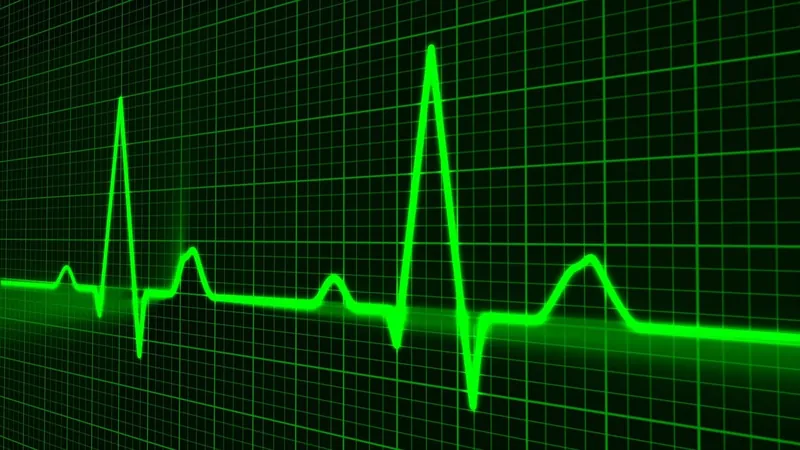
Revolutionary Heart Pump Breakthrough at Emory: A Lifeline for Heart Failure Patients!
2024-12-23
Author: Ming
Introduction
In a groundbreaking medical achievement, Emory University Hospital has become the first facility in the United States to surgically implant an innovative heart pump, the BrioVAD System, designed specifically to assist patients suffering from heart failure. This new device not only promises enhanced comfort but also represents a significant advancement in heart pump technology.
Expert Insights
Dr. Mani Daneshmand, a leading cardiothoracic surgeon at Emory, expressed his excitement about this milestone, stating, “It’s thrilling to witness ongoing innovation in our field.” With over two decades of experience working with heart pumps, Dr. Daneshmand noted a transformative shift in patient care: “We’ve advanced from merely preventing death to enhancing the quality of life for our patients.”
The Role of Ventricular Assist Devices
Ventricular assist devices (VADs), like BrioVAD, are crucial for patients who do not respond to traditional treatments such as medications or surgeries. They can also serve as temporary solutions for individuals awaiting heart transplants. Historically, VADs have been bulky and complicated, often accompanied by significant risks of complications like infections. The traditional version required major open-heart surgery and necessitated wearables that were cumbersome and burdensome.
Innovative Design of BrioVAD
The BrioVAD System stands out by being smaller, lighter, and designed with patient comfort in mind. As Dr. Daneshmand elaborated, “The new design mimics the heart’s natural rhythm, providing gentler support while allowing for a more seamless patient experience.” Unlike older models that utilize two heavy batteries, the BrioVAD’s compact design integrates the controller and a single lighter battery, significantly reducing the load for patients.
Clinical Trials and Future Prospects
Having received the green light from the U.S. Food and Drug Administration to initiate clinical trials, Emory is at the forefront of evaluating the BrioVAD System's effectiveness alongside prominent medical institutions like the Cleveland Clinic, Duke University, and the University of Chicago. The trial aims to involve about 750 patients over the next two to three years, comparing the new device's performance to existing therapies for end-stage heart failure.
Goals of the BrioVAD System
Dr. Daneshmand is optimistic about the potential of the BrioVAD, emphasizing that the goal isn’t necessarily to outperform existing treatments but to demonstrate comparative effectiveness while significantly improving the patient experience. “We want fewer side effects, easier usability, and overall comfort for our patients,” he said.
Impact on Heart Failure Patients
Heart failure is a pressing health crisis, affecting approximately 6.2 million Americans and accounting for one in eight deaths annually, according to the Centers for Disease Control and Prevention. However, advancements like the BrioVAD System could change the narrative. Studies have shown that patients with advanced heart failure who receive a heart pump can enjoy a survival rate extending five years or more.
Patient Success Story
The inaugural recipient of the BrioVAD System, a young woman in her early 30s grappling with dilated cardiomyopathy, is reportedly thriving post-surgery. Her recovery highlights the potential of this new device to not only stabilize but significantly uplift the lives of individuals battling severe heart conditions.
Conclusion
According to Dr. Daneshmand, the feeling of witnessing a patient’s transformation and improved vitality is unparalleled. “It’s an incredible reward to turn a patient’s condition around,” he shared with enthusiasm, reflecting the promise that BrioVAD holds for the future of heart failure treatments. With Emory Healthcare leading the nation in the implantation of VADs, advancing technologies like the BrioVAD are set to redefine patient care and rekindle hope for many facing heart challenges. As the clinical trials progress, the heart health community eagerly anticipates further breakthroughs. Could this be the new era in heart failure treatment? The answer could change countless lives!


 Brasil (PT)
Brasil (PT)
 Canada (EN)
Canada (EN)
 Chile (ES)
Chile (ES)
 España (ES)
España (ES)
 France (FR)
France (FR)
 Hong Kong (EN)
Hong Kong (EN)
 Italia (IT)
Italia (IT)
 日本 (JA)
日本 (JA)
 Magyarország (HU)
Magyarország (HU)
 Norge (NO)
Norge (NO)
 Polska (PL)
Polska (PL)
 Schweiz (DE)
Schweiz (DE)
 Singapore (EN)
Singapore (EN)
 Sverige (SV)
Sverige (SV)
 Suomi (FI)
Suomi (FI)
 Türkiye (TR)
Türkiye (TR)